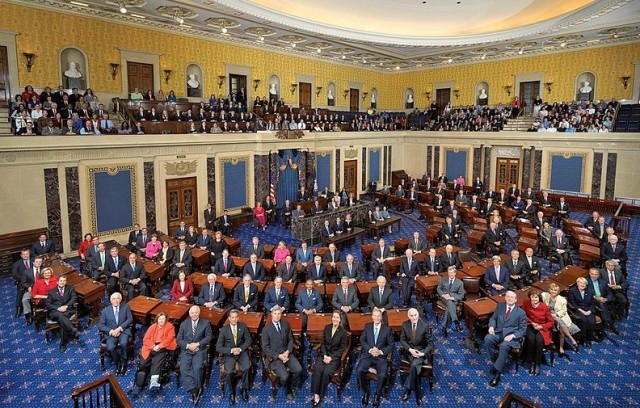
With little fanfare, the United States Senate is poised to re-authorize the FISA Amendments Act, the controversial legislation that gives the federal government broad powers to intercept Americans' international communications without a warrant. The House of Representatives approved a five-year extension in September, but without Senate support, some government surveillance powers will expire at the end of the year.
The legislation originally passed in 2008. As we reported at the time, it created a new system of "authorizations" that allows senior government officials to sign off on international wiretapping schemes. The government must submit a description of its spying plans to a judge—but the government does not need to "identify the specific facilities, places, premises, or property" at which the eavesdropping will occur, as it would need to in the case of a search warrant. That could allow the government to engage in dragnet surveillance without meaningful judicial oversight.
The government has been tight-lipped about whether it is actually engaging in such surveillance. Since last year, Sen. Ron Wyden (D-OR) has been pressing federal officials for details about how many Americans have been the target of surveillance under FISA authorizations. The government has refused to give even a ballpark figure, meaning we don't know if the government has spied on dozens of Americans, or millions of them.
Groups such as the Electronic Frontier Foundation are urging Americans to call their Senators to oppose reauthorization of the FISA amendments. But opponents, recognizing that stopping the legislation is a long shot, have also offered amendments that would strengthen Americans' privacy and bring more transparency to the government's surveillance activities.
Wyden has offered an amendment that would require the government to publicly disclose details about how many Americans have had their communications intercepted based on FISA authorizations. His fellow Oregonian Sen. Jeff Merkley (D-OR) is offering an amendment to declassify key decisions of the secret FISA court. At least one of those rulings reportedly found that government surveillance activities during the Bush administration violated the Fourth Amendment.
On the Republican side, Sen. Rand Paul (R-KY) has offered an amendment dubbed the "Fourth Amendment Protection Act" that would require the government to seek a warrant, as required by the Fourth Amendment, before seeking information held by a third party. The amendment would extend Fourth Amendment privacy protections to cloud e-mail providers, from whom it is currently easier to get access to someone's stored e-mail than it would be if officials wanted to search that person's home computer.
Finally, Sen. Patrick Leahy (D-VT) has offered an amendment to require that the law be re-authorized again after three years; the current Senate bill would re-authorize surveillance for five years.
If the Senate adopts the language approved by the House in September, the bill can go straight to President Obama for his signature. If the Senate accepts any of the four amendments, it will need to send the legislation back to the House for another vote.
reader comments
55